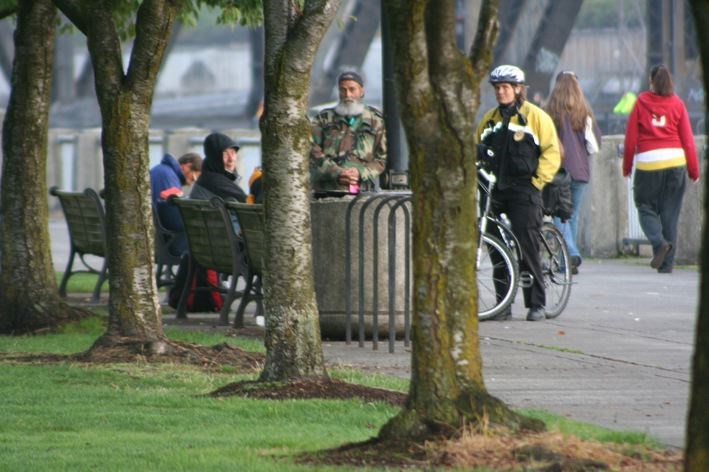Editor's note: A dozen people from Prince George, including city councillors and Citizen reporter Mark Nielsen went to Portland, Oregon in October 2008 to learn how that city was dealing with the homeless and downtown revitalization. With the city's downtown task force set to get to work in the new year, here are Mark's stories from that trip.
PORTLAND, ORE. -- Portland's Housing First strategy may have found long-term housing for 1,500 homeless people in just two years, but there is plenty of work still to be done.
Walk along Waterfront Park, which hugs the banks of the Willamette River, and it doesn't take long before you'll pass by at least a few homeless people occupying the benches or sleeping on the grass as cyclists and runners speed by.
Jeremy Bloomer remains one of those on the outside looking in and is frustrated by the trouble he's encountered trying to get a hand up.
The 38-year-old former resident of Salt Lake City, Utah, readily concedes he's on the street because he made some bad choices beginning at age 21, when he started doing drugs.
Although he still smokes marijuana, Bloomer said he quit doing methamphetamine about three years ago when he "just got tired of chasing it."
Ironically, Bloomer says, the decision to stop may be one of the reasons why he's not been able to get any help beyond the soup kitchens and hand outs of second-hand clothing.
"You have to be an alcoholic, you have to be a drug addict, you have to be somebody in recovery," he claimed as he stood across the street from one of the city's Housing First developments.
Adding to his troubles, Bloomer has a part-time job but he's paid under the table. In other words, he doesn't receive a stable source of income with which to cover his share of the subsidized rent.
"The government wants you to have that cheque, otherwise they just think you're a bad risk," he said.
He's married -- his wife, whom he did not name, is an alcoholic -- and he has two children who remain with relatives back in Salt Lake City.
While he sleeps under bridges and in alcoves, she spends her nights in a shelter for women. They came close to securing an apartment through the city's program.
But he ran into a procedural problem when he was unable to produce proper identification. Bloomer said he was given an extra two months to get a birth certificate, and managed to get one with about a week to spare.
"And they answered that they entered my deadline in the computer wrong and gave me only two weeks," he said. "So now, if I want housing again, I have to wait another two years."
There's now also the matter of his dog, an affable pit bull mix named Sid Vicious, which he rescued about a year ago and for whom he has a strong emotional attachment.
"I can't get rid of my dog," he said. "There are some places that will take dogs but most of them won't, so I just continue to live out here on the streets until another opportunity arises or until I can find another full-time job during the week that gets me some more money."
Bloomer said he's never heard of Housing First but said it might be a good idea. His advice to those developing a strategy for homelessness in Prince George is to make sure the voice of the homeless is heard on the planning committees.
"You need some people to represent the homeless that are actually homeless," he said. "You can't just look at a book or at a graph.
The aim of Portland's Housing First strategy is to "end homlessness" but there is a proviso in the city's 10-year plan -- that those who prefer to remain homeless are left alone.
James Kofi, 59, could be considered one of them.
"I love it," said Kofi shortly after he crawled underneath his blanket for a nap on a park lawn along the west bank of the Willamette River.
Despite the lack of shelter, Kofi said it's still a better life than dealing with the stress, worry and discipline of trying to make ends meet.
"I used to get a room for $300 but no more, a room now is $400, $500 ... you have to work every day to maintain that properly and I'm tired," he said. "So in this case, I sleep over here and work when I can.
"I had a car, a 528 BMW and all that jazz, but the point is, you've got to keep working and then the money that you earn, you don't save, it goes to rent, electricity, gas bill and then you keep working and I'm tired."

.png;w=120;h=80;mode=crop)

